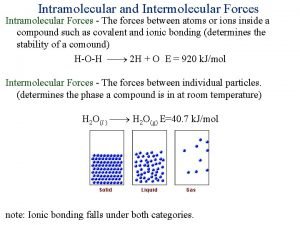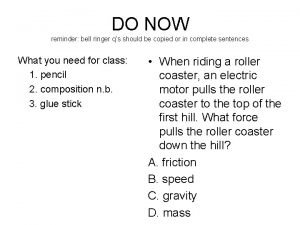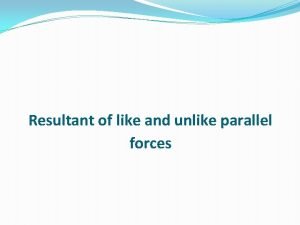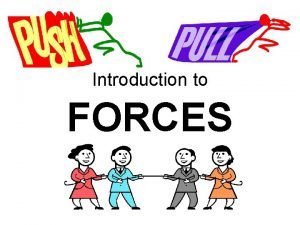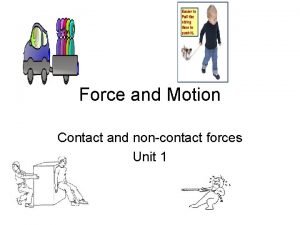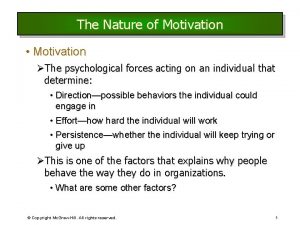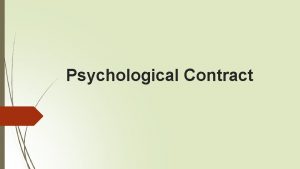NATURE OF MOTIVATION WHAT IS MOTIVATION Psychological forces







- Slides: 7

NATURE OF MOTIVATION

WHAT IS MOTIVATION? • Psychological forces that determine the direction of a person’s behavior in a an organization, a person’s level of effort, and a person’s level of persistence. Nothing sparks motivation in someone like some good ole Rocky Balboa.

IMPORTANCE OF MOTIVATION & HOW PEOPLE ARE MOTIVATED Motivation is essential to management in jobs and organizations because it explains why people behave the way they do. It determines why one manager tries to maximize their salary while another manager places the organization’s goals before their own interests. Employee’s different types of motivation will ultimately dictate how efficient and effective an organization will achieve their desired goals. SOURCES OF MOTIVATION Intrinsically motivated behavior Extrinsically motivated behavior Prosocially motivated behavior How a person is motivated is not a fixed behavior, rather it is very fluid and can contain behaviors from all three types that is based off the individual's own personal characteristics (personalities, values, abilities, attitudes, and needs), nature of their job , and the nature of their organization (structure, culture, control systems, HR, and rewards).

INTRINSICALLY MOTIVATE BEHAVIOR Behavior that is performed for its own sake; the source of motivation is actually performing the behavior and motivation comes from doing the work itself. Many managers will be intrinsically motivated. • Sense of accomplishment or achievement for helping organizations achieve their goals and gain competitive advantages. • Jobs that are interesting and challenging to the person. • Commercial photographer taking creative photos. • teacher teaching children • Nasa engineer performing work for a shuttle launch. National Geographic Photographer Jimmy Chin capturing climbers at Yosemite National Park in California.

EXTRINSICALLY MOTIVATED BEHAVIOR Behavior that is performed to acquire material or social rewards or to avoid punishment; the source of motivation is the consequences of the behavior, not the behavior itself. • Car salesmen who is motivated by commission. • A Lawyer who is motivated by the high salary and status that go along with the job. • Factory worker who is motivated by the opportunity to earn a secure income. • Or an executive who strives to simply buy a Ferrari or an Aston Martin. An individual’s dream of having a Ferrari parked outside a mansion can be considered extrinsically motivated behavior.

PROSOCIALLY MOTIVATED BEHAVIOR Behavior that is performed to benefit or help others. While Intrinsic and extrinsic motivated behavior dominate most people’s source of motivation, prosocially behavior can coexist with the other sources. • A teacher who enjoys the process of teaching young children (high intrinsic motivation), but also has a strong desire to give children the best learning experience possible and help those with learning disabilities overcome their challenges, and who keeps up with the latest research on child development and teaching methods has high prosocially motivation along with the intrinsic motivation. • A surgeon who specializes in organ transplants and enjoys the challenge of performing complex operations, has a strong desire to help her patients regain their health and extend their lives through successful organ transplants, and also is motivated by the relatively high income that is shared with the job has high intrinsic, prosocial, and extrinsic motivation. A physical therapist at Brooke Army Medical Center helping a wounded veteran would have a high prosocial motivation presence.

FIND YOUR WHY.
